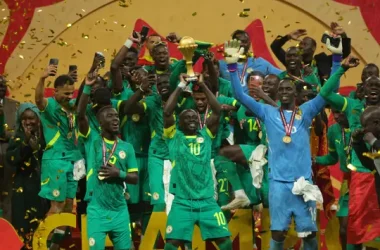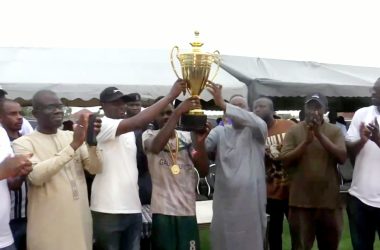The following article is reprinted with permission from The Daily Astorian of Astoria, Oregon, USA.
By PATRICK WEBB
The Daily Astorian
BAKAU, The Gambia — My brother’s wedding in West Africa is over, and I must call England and describe the wonderful celebrations to our Mum and Dad, octogenarians too frail to travel.
My cell phone does not work, because I was too cheap to buy the AT&T overseas package.
So I wander out of the African Village Hotel in the oceanfront village of Bakau, across the street to a tiny storefront that offers phones for rent.
What follows brings me to tears.
As with every business transaction in The Gambia, there are introductions and social formalities to be observed first. We could learn a lesson from this pace and courtesy in the U.S.
I get talking with the store operator, Sankareh Jawo, and his friend. They already know who I am. The hotel staff, and, it seems, the whole neighborhood, know my brother from prior visits. They are excited that he has married a lady from their country, and delighted that he and I wore African suits for his big day.
Our talk shifts to soccer. The next World Cup is being hosted in Africa for the first time. Eventually, we focus on whether the English squad, filled with spoiled brats like Rooney and Beckham, will gel as a team.
“We won when I was a kid, but I wonder if we will ever win again in my lifetime …” I begin.
Regular readers will recall that July 30, 1966, was the most memorable date in my childhood. I was 9, and England beat West Germany 4-2 to win the World Cup.
Amazingly, Sankareh takes over. He tells me he listened to the championship game on the radio in The Gambia, because TV didn’t come to his area until the mid-1970s.
We start talking about the players, 11 names etched in folklore. I start with goalkeeper Gordon Banks, and list the defenders and midfielders: Cohen, Wilson, Charlton, Moore, Ball …
I am in agony; I cannot remember the other midfielder.
“Stiles,” says Sankareh, who joins me in reciting aloud the whole team. (Hunt, Hurst, Peters and the other Charlton brother). How could anyone forget Nobby Stiles, the hard-as-nails tackler with no front teeth, one of two stars from Manchester United?
I regale Sankareh with how sickened I felt when Jackie Charlton was called for a foul against a German striker in the waning minutes. Our arch-rivals scored to send the 2-2 game into extra time.
Then this dignified African gentleman makes one of the most remarkable comments I have heard in my adult life.
“You’ve won it once, now go out and win it again.”
I ask him to repeat what he has just said.
“You’ve won it once, now go out and win it again.”
I understand. I cannot stop the tears. It is the famous quote from Sir Alf Ramsey, the England manager, before 30 grueling minutes of extra time in which England scored twice to win the cup.
Eleven words that inspired immortality for 11 men.
I am multiple time zones away from home in the tiniest nation in Africa with a new friend. I am crying; he is smiling. We are men, separated by continents, religion, skin color, language – just about everything.
But we are soccer fans, bonded by our sport, savoring a game played 44 years ago.
We are kindred spirits, at peace.
Once I have wiped away my tears, I call Mum and Dad, tell them about the memorable wedding, and promise to bring them photos.
Normal life resumes.
Until June, when the 2010 World Cup kicks off.
English-born Patrick Webb, managing editor of The Daily Astorian of Astoria, Oregon USA, visited The Gambia in November. The World Cup in South Africa starts for England with a game against the U.S. national team June 12.
Trending :
- 1 week ago
- 9th Kankurang Festival Slated For 23rd- 25th January 2026
- 1 week ago
- Hundreds Paint Serekunda Red Following Senegal’s Triumph Over Morocco
- 2 weeks ago
- Barrow Describes NPP’s By-Elections Triumphs As ‘Referendum’ Between Governing Party & Opposition
- 3 weeks ago
- Menteng-Led UMC Delegation To Jarra Sukuta Disgraced
- 3 weeks ago
- Will Gambian Police Succeed In Unlocking Austrians’ Crypto Vaults?




